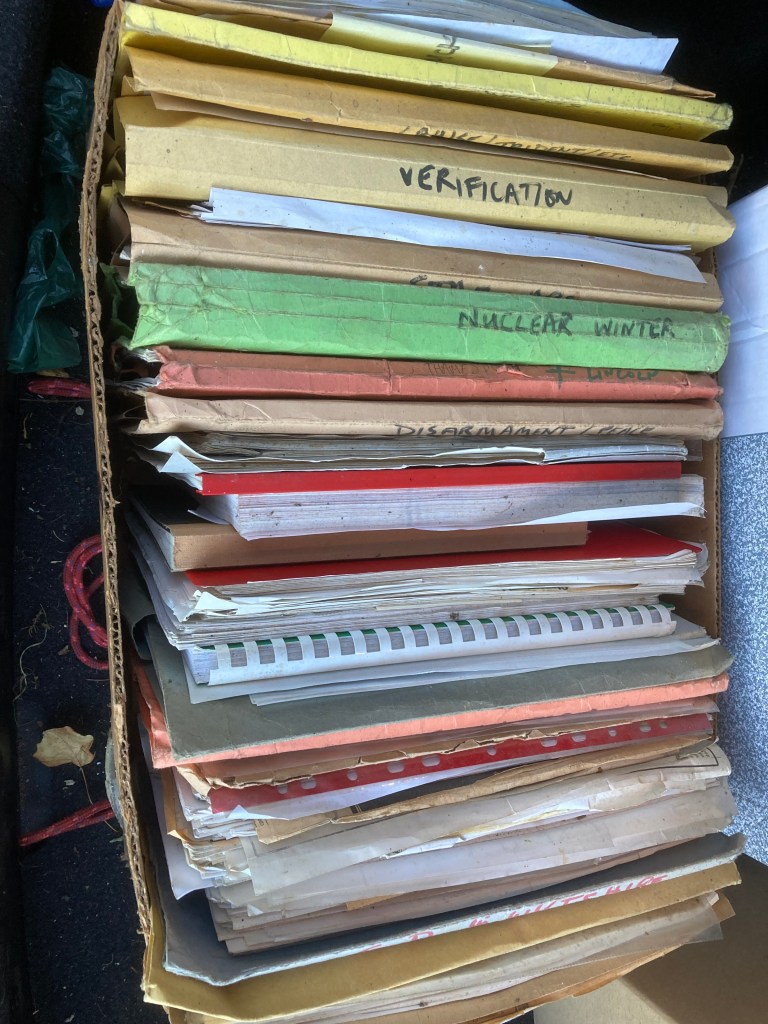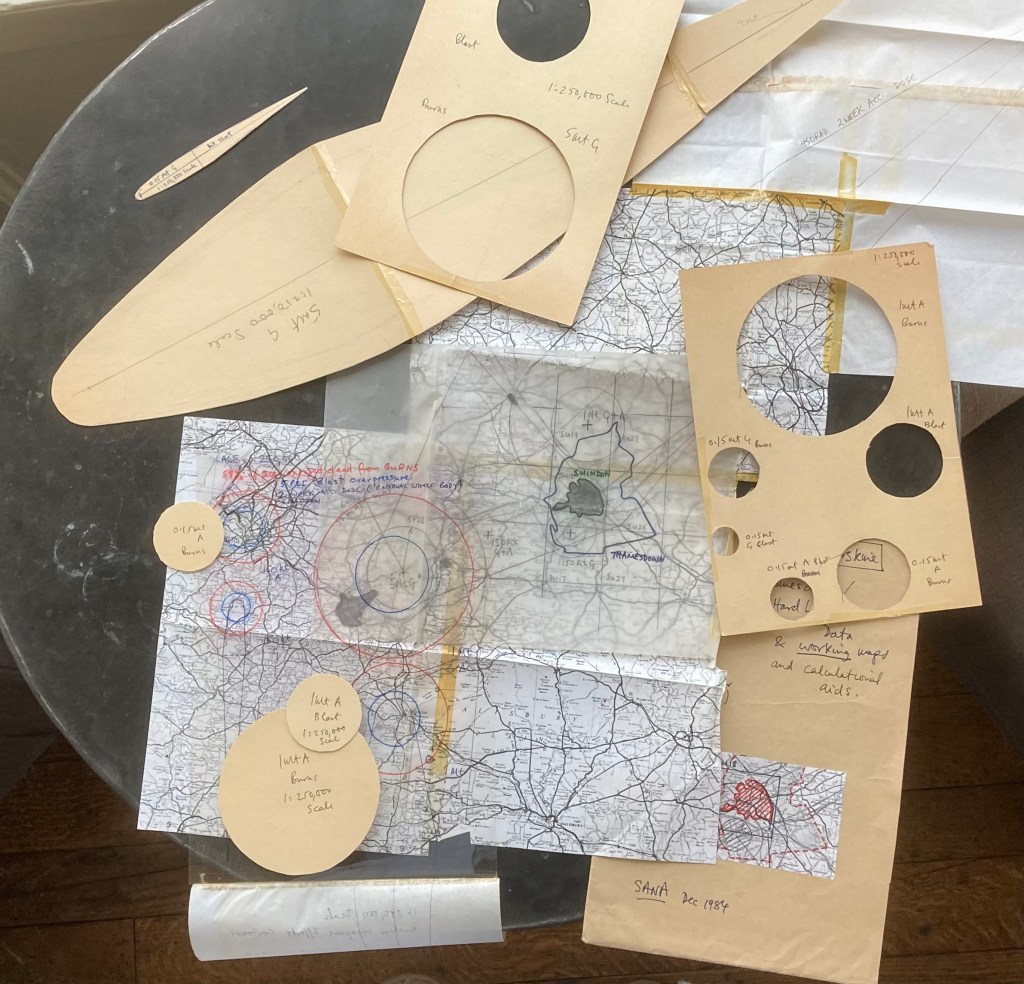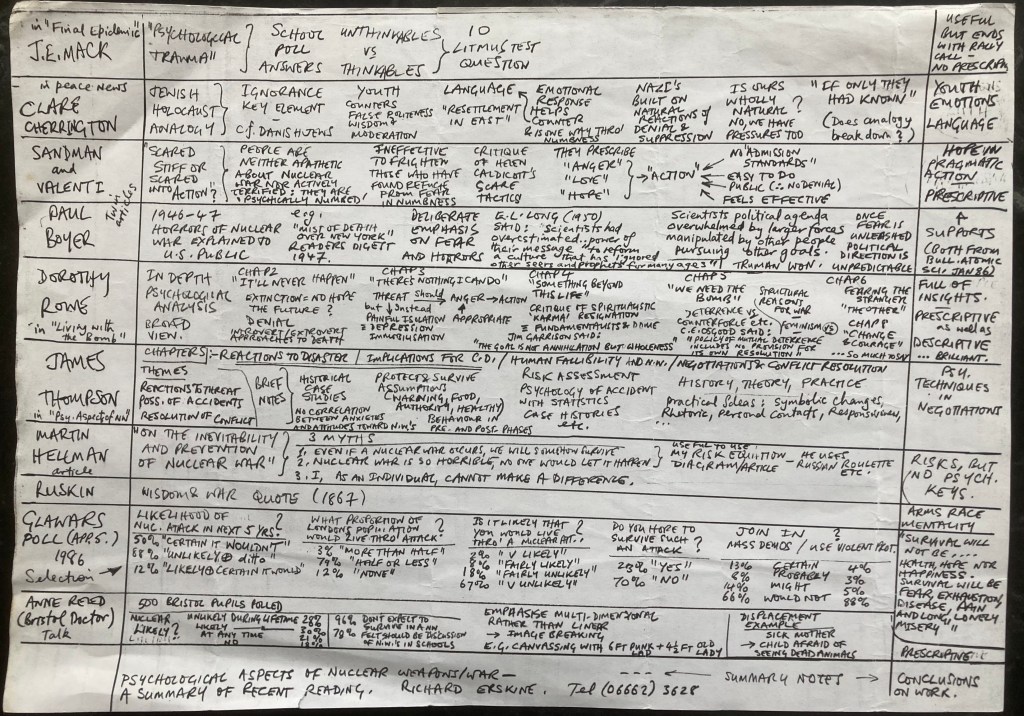Clearing out over 40 years of files can throw up so many surprises and emotions. This box contained files from the 1980s when I was in my spare time research coordinator for SANA (Scientists Against Nuclear Arms).

One file, preparatory work we did for a local authority preparing a report on the likely impacts of a nuclear attack (countering the whitewashing ‘Protect and Survive’ from the UK’s Home Office). I wrote a program that ran on an Amstrad 8256 to do the maths on casualties.

We helped several local authorities to speak truth to the powers that were telling people to whitewash their windows! The group became a kind of research group for the peace movement, often working quietly from bedrooms and offices, trying to make a difference.
Meanwhile those in the front line – those brilliant Greenham Women – faced the reaction of those who turned fear into hate, stirred by the same media outlets who today pour scorn on those demanding action.
Where is the statue to those brave ladies I muse, as I flick through another file full of newspaper cuttings?
Another file on readings of psychological responses to the nuclear threat, which I summarised on a one pager. Some of the insights seem universal. Denial is a complex condition, and I always cringe when those in denial on climate change feel they are being linked to holocaust denial.

The truth is that most of us are in denial much of the time, because we’d go crazy otherwise. But there are consequences to this.
In my life I stepped back from active work on the nuclear issue to focus on family and career. Burnt out you might say, and needing a break.
Only in my retirement did I wake up to climate change, after reading Naomi Klein’s ‘This Changes Everything’, and then hearing her speak in Cheltenham. That was quite the kick up the proverbial!
The nuclear threat has not gone away and Russia is now escalating the risks. C.E. Osgood said
“the policy of mutual deterrence includes no provision for its own resolution”.
The risks are pretty binary.
Climate change is different despite some who suggest otherwise (its scales of damage, creeping past us and towards us), but the psychology has common threads.
People ask why decent cultured Germans did not stop the Nazis. Their denial was much more relevant to our current situation than the denial of neo-nazis regarding the holocaust, or the denial of dangerous man-made global warming by the self-appointed ‘contrarians’ who control the right wing media.
It is not that people are intellectually ‘in denial’, any more than a smoker who knows very well the health risks. It is the emotionally centred denial that puts off action.
People are worried about climate change and want action taken – overwhelmingly they do, as studies clearly show – but they have been unable to get beyond that numbing inability to turn wishes into actions. It all seems too much.
As Sandman and Valenti said in relation to the nuclear threat: People are neither apathetic nor actively terrified, but they are psychologically numbed.
The “don’t make a fuss” narrative is alive and well, and soon to be brought into law by our Home Secretary Priti Patel.
But those who did and do make a fuss – The suffragettes, Greenham Women and XR – had the same energy, the same moral outrage which we too often keep bottled up. It hasn’t escaped my notice that it is often women who are the first to step forward, to speak up.
Being polite and “reasonable” can do a lot but rarely is enough to shift powerful forces using propaganda to manipulate public sentiment (to aid in the process of mass denial).
The great psychologist Dorothy Rowe said, in relation to Bomb that we need to convert anger & depression into hope and action. Protest is never enough.
E.L. Long wrote in 1950 in relation to nuclear threat
“scientists had overestimated … power of their message to reform a culture that has ignored other seers and prophets for many ages”.
Only positive visions and futures can change the psychology of mass denial on climate change. Nuclear threats are oddly more intractable, but ought to be simpler, to resolve.
On climate change I veer between despair and optimism, but as many wise heads have said, hope is important, but much easier to sustain if coupled with action: engaging with the community, local counsellors, national politicians, businesses and the rest.
As Katharine Hayhoe replies when asked “what is the first thing I should do about climate change?”
“talk about it!”
with family, friends, colleagues.
Those forces who want to delay action, are happy to have a psychologically numbed populace. Talk and engagement is a great antedote. Telling your counsellors and parliamentary candidates that your vote depends on them demonstrating they really mean action, is another. We all have agency in some or many forms.
Now, I must get back to clearing more of those boxes and piles of papers, no doubt uncovering more memories, triggering more musings.
(c) Richard W. Erskine, 2022

Enlightening and inspiring as always.
LikeLike
Thank you Alison.
LikeLike